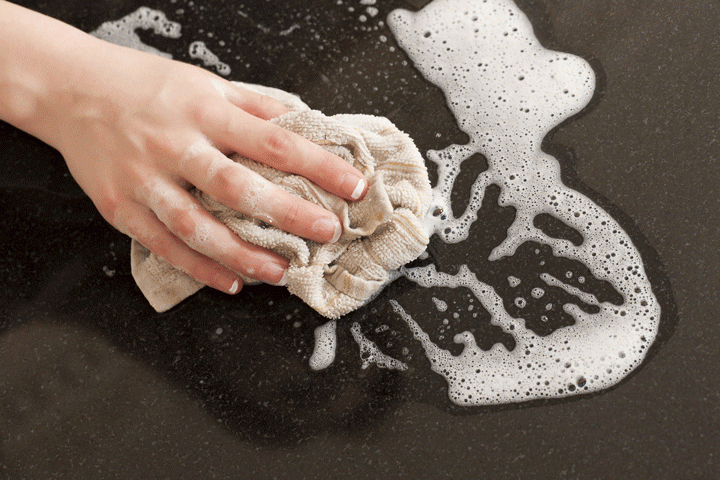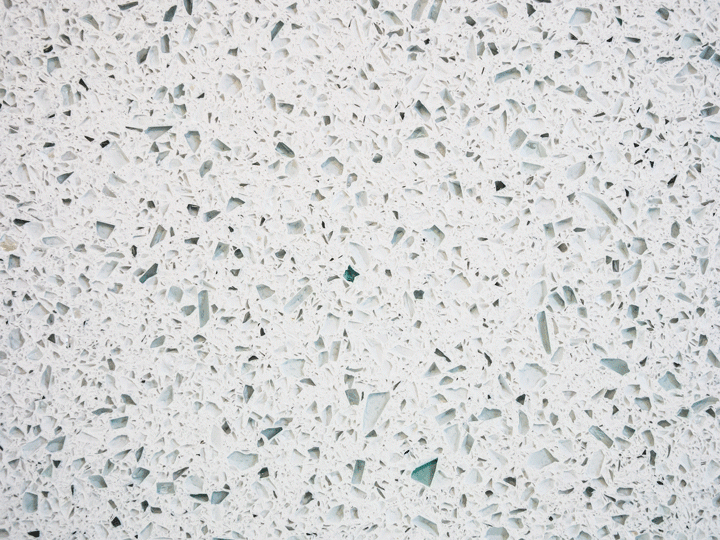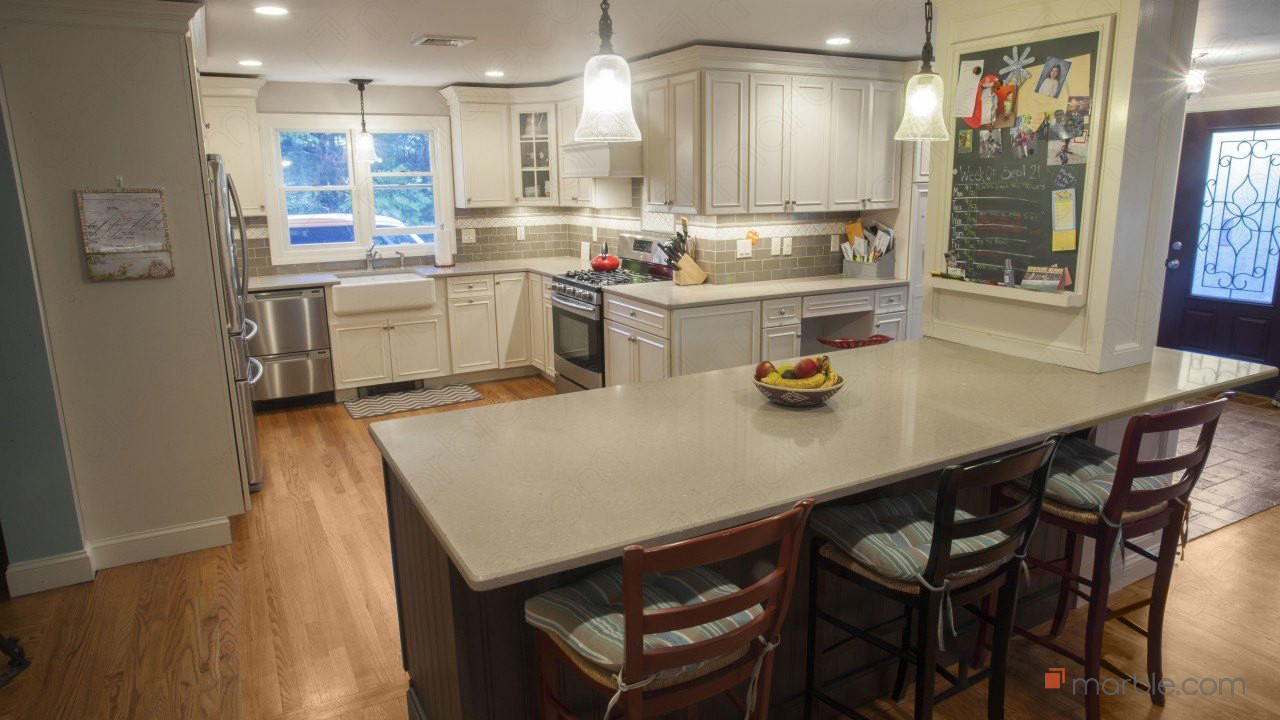
Table of Contents
Granite is one of the easiest natural stones to care for. That said, it will still require care in order to stay in great shape. This guide will help you learn how to properly care for this incredible natural stone. Considering that granite countertops are such a significant investment for any home, you will want to make sure that the surfaces do not sustain damages as a result of poor care.
How Can Granite Countertops Sustain Damages?
Although granite is one of the toughest materials you can find, it can still get damaged in a few ways. This section will outline some ways that your granite can get damaged.
[get_quote]
Improper Cleaning Methods
Improper cleaning includes using harsh cleaning products such as ammonia or bleach to clean your granite countertop. Cleaning with either one of these, or any other cleaner that is acidic, can negatively impact your granite. Rather than these cleaners, you should only use products that are intended for use with granite and natural stone, such as this cleaner. Never use any abrasive tools to clean, such as steel wool or Brillo pads. Use a soft cloth instead.
No Seal/Weakened Seal
To protect your granite countertop from stains and liquid damages, you must seal the surface. This involves applying a sealant to your granite countertops in order to fill the pores that are present in the stone. This process will prevent stains and liquids from penetrating the surface, which allows your granite countertops to retain their amazing looks. However, if you do not seal your granite countertops, you are leaving them susceptible to damages. In addition, you will need to re-seal granite periodically, as the sealer wears off after a while. Typically, granite countertops only need to be sealed once a year.
Careless Actions
Careless actions include behavior such as jumping, sitting, kneeling or leaning on your granite countertop. Granite countertops typically do not crack, but can if you jump, sit on, kneel on or lean on the surfaces. These are damages that can easily be avoided.
Sealing Your Granite Countertops: How to Seal, Why and How Often
As you can tell from above, sealing your granite countertops is a very important part of granite care. Although it may sound like an inconvenience, sealing your granite countertops is a quick and simple process that will ensure that your countertops are protected from various household hazards.
How to Seal
Before you actually begin to seal the countertop, you will first need to choose an ideal sealant to use. There are plenty of products that you can find on the market; however, some are better than others. Perhaps you want to use this professional grade sealer that is suitable for indoor or outdoor use. Or maybe you want something that is both effective and comes in an easy-to-use spray bottle, such as Superior Zero Ultimate Stone Sealer.
Once you have found the product that you want to use, you can begin the process of sealing your granite countertop. To start, mask off all areas that you do not want to treat with the sealer. Next, apply the sealer to your countertop. Either spread it across the surface with a brush or spray it on if your sealer comes in a spray bottle. Always follow the instructions that come with whatever specific product you are using.
After this, wait for 15 to 30 minutes. If you notice that the sealer has absorbed during this time, apply another coat. Once this time is up, you can remove any excess sealer from the surface.
The last step of the process is to let your countertop sit for at least 24 hours. This is done so that the sealer has enough time to cure. Once you have done this, your granite countertop is sealed.
| Step 1 | Choose a sealer |
| Step 2 | Apply to the countertop |
| Step 3 | Wait for 15 to 30 minutes (apply extra coat if needed) |
| Step 4 | Remove excess sealer from the surface |
| Step 5 | Let your countertop sit for 24 hours so the sealer can cure |
Why Do You Need to Seal Granite Countertops?
As mentioned above, sealing granite countertops helps protect the surfaces against stains and liquid damages. Granite (much like other natural stones) is porous, meaning that liquid is able to get into the pores of the stone. If this happens, your granite countertops can weaken over time.
How Often Do You Need to Seal Granite Countertops?
Generally speaking, you will only need to re-seal your granite countertops once every year. With that in mind, every type of granite is different, so you may need to seal some more often than you would others.
How Can You Tell it is Time to Re-Seal?
To determine if your granite countertops need re-sealing, there is a simple test that you can do. Pour a small amount of water on a small area of the countertop. After you do this, wait for 15 minutes. If you notice the water has beaded on the surface, your seal is still effective. On the other hand, if you notice that the water has absorbed into the surface, you must re-seal as soon as possible.
| Step 1 | Pour a small amount of water on a small area of the countertop |
| Step 2 | Wait for 15 minutes |
| Step 3 | See if the water has absorbed or beads on the surface (This will determine if your granite countertop needs to be re-sealed) |
Cleaning Granite Countertops: What to Know
In addition to sealing, regularly cleaning your granite countertops can help them stay in terrific shape. While you can use mild dish soap and warm water for everyday cleaning purposes, there are also cleaners made especially for use on granite countertops. Products such as the All Granite and Marble Countertop Cleaner can help you keep your granite looking amazing. This particular cleaner also contains a bit of sealer, which is helpful for your countertop.
Never use any cleaners that are acidic, as these can wear away at the surface of any natural stone. Acidic cleaners include bleach, ammonia and Windex. Something helpful to keep in mind is that any cleaner with an orange or lemon scent is not good for natural stone countertops, as they contain citric acid.
The following is a list of some other tips related to cleaning and maintaining granite countertops.
Clean Up Spills Immediately
Even if your granite is sealed, it is never a good idea to leave any spills sitting on your countertop for a prolonged period of time. If you do, it could potentially cause stains if your seal is not at full strength.
Use Coasters for Beverages
Although not common, granite can receive water stains. One of the causes of water stains is condensation from beverages that have been sitting on the countertop for too long. To avoid water rings and other stains, make sure to always place a coaster underneath your beverage.
Use Trivets and Hot Pads
One of the major benefits of granite is that the stone is resistant to heat. But even though it is heat resistant, this does not necessarily mean it is heat proof. Use trivets and hot pads if you are going to place any hot pots or hot pans on your granite countertop. While these items are not certain to cause damages, you are better off exercising as much caution as possible.
Use Soft Cleaning Tools
Do not use any cleaning tools that are rough, as you may scratch the surface of the countertop. In addition to being heat resistant, granite countertops are also scratch resistant. But as with heat, this does not mean the surface is completely scratch proof. When cleaning, use a soft cloth or a sponge to avoid any potential damages.
Use Cutting Boards
Granite countertops are so tough that they will actually dull a kitchen knife used on the surface. In the interest of protecting your knives, in addition to being a good idea in general, use a cutting board when preparing food.
Do Not Use Tile or Grout Cleaners
Never use tile or grout cleaners to clean your granite countertops. Some of these products contain harsh chemicals that can scratch or dull your granite.
Do Not Store Liquids on Your Granite Countertop
Another helpful tip for keeping your granite in good shape is to make sure you do not store liquids on the surface. Cooking oils, perfumes or lotions are just a few examples of liquids that can leak and potentially cause stains.
[get_quote]
Establishing a Maintenance Routine
To properly care for your granite, it is in your best interest to establish a maintenance routine. Doing so will keep your granite countertop in great shape both now and in the future.
Daily Maintenance
For daily maintenance, wipe the countertop down with warm water and mild dish soap. Make sure to use a sponge or soft cloth.
Weekly Maintenance
Once every week, it is a good idea to totally clean your countertop off and use a granite cleaner. This is a more effective way to deeply clean the surface than just using warm water and dish soap.
Monthly Maintenance
For monthly maintenance, you can use a polishing product to help your granite countertops retain their distinctive shine.
Yearly Maintenance
Roughly once a year, you will need to re-seal your granite countertops. The seal weakens over time and if you do not have an effective seal, your granite countertop is prone to staining and other damages.
How Can You Polish Your Granite Countertops?
Most granite countertops that you will find will have one of two finishes: Polished or Honed. Polished granite countertops will appear shiny, while honed granite countertops will have a matte finish. The finish your granite countertop has will be created while the stone is being processed. Any polishing products, such as the one mentioned above, are designed to enhance the finish of your granite. These products will not give your granite countertop its distinctive shine, but rather keep it looking that way.
What Can You Do About Stains on Granite Countertops?
Granite is one of the least likely natural stones to encounter stains. However, just as it is resistant to heat and scratches, that does not necessarily mean that your granite countertop can never get stained. If the surface is not properly sealed, it will be susceptible to staining. For most stains, you will be able to resolve the issue by using a poultice.
To make the poultice, you will have to mix certain ingredients based on what type of stain you have. Typical mixtures often include baking soda, water or other substances. Keep in mind that you should never use any harsh substances in an attempt to remove stains.
Do Certain Types of Granite Stain More than Others?
Yes, certain types of granite are more prone to staining than others (if not properly sealed). Lighter colored granite countertops are more porous, meaning they are more likely to stain than darker colored granite countertops.
What Can You Do About Granite Chips?
Granite is one of the strongest natural materials that you can have in your home. While this is the case, the natural stone can chip in rare cases. Typically, any chips will occur on or near the edges of the countertop and will be the result of a heavy object being dropped on the surface.
If you do have any chips in your granite countertop, these can be fixed relatively easily. There are easy-to-use granite chip repair kits that you can find.
What Can You Do About Granite Cracks?
Much like chips, granite cracks are not the end of the world. While it is not ideal to have your countertop crack, these can be fixed as well. In this case, you will likely need a stone repair specialist to check out the crack and determine how it needs to be fixed.
Why Install Granite Countertops?
Although you have read about various types of damage above, these damages can be easily repaired and are easily preventable in most cases. There are many fantastic reasons to install granite countertops in your home. This section will highlight some of the reasons why granite is truly a magnificent choice for any home.
-
Granite countertops are naturally beautiful
-
Granite is one of the most durable natural stone countertop options you have
-
The stone is one of the easiest to care for
-
Granite is resistant to heat, stains and scratches
-
Every slab of granite is unique
Natural Beauty
Because granite comes from the earth, the stone will allow you to add a touch of natural beauty to your home. While there are many other beautiful types of stone, whether natural or engineered, granite will give you hundreds of options to choose from. You will be able to find virtually any color or style you are looking for. From light to dark, traditional to modern, there is truly a type of granite that fits every home.
Durability
When it comes to natural stone, you will not find many options that are more durable than granite. Quartzite is another durable natural stone, as is the engineered stone quartz. As long as you take proper care of your granite, it should stay in terrific shape for many years to come. In fact, granite is such a durable material that it will likely outlast your time living in your home.
Easy to Care For
As you can tell from the information above, maintaining granite does not require extensive effort. Compared to many other natural stone countertop options, caring for granite is a breeze. Many of the care processes will take just minutes of your time, such as re-sealing. Natural stones like marble are more porous than granite and will need to be re-sealed more often. For comparison, while you will only need to re-seal your granite countertops around once a year, it is recommended that you re-seal your marble countertops once every few months.
Resistant to Heat, Stains and Scratches
Granite is resistant to heat, stains and scratches, while many other countertop options are not. For example, quartz countertops cannot handle the amount of heat that granite can. Stones such as marble, quartzite and limestone are more prone to staining than granite is. Soapstone is susceptible to scratches, while granite is not. So while each stone countertop material has its advantages and disadvantages, granite is one of the best all-around options you have.
Every Slab of Granite is Unique
If you want a natural stone countertop that is one-of-a-kind, you will get just that with granite. Each slab of granite is unique – even slabs that come from the same quarry. While specific types of granite will look similar, no two slabs look perfectly alike. Compare this to the engineered stone quartz, where you will be able to find multiple slabs that look exactly alike.
How Does Granite Get from the Quarry to Your Countertop?
In locations all over the world, granite is extracted from the earth, cut into blocks, shaped into slabs and shipped off to a fabricator. The fabricator will further shape the stone to accommodate the specific needs of your countertop.
What Are Some Alternatives to Granite?
If you are still in the process of searching for your next countertop, you may be interested in what alternatives exist to granite. Your top options will include quartz (an engineered stone) and natural stones such as marble, quartzite, onyx, travertine, gemstone, limestone, slate and soapstone.
How Much Does Granite Cost Compared to Other Options?
Granite is one of the least expensive stone countertop options. While it is not cheap, it is more budget-friendly than many of the alternatives. The table below gives you a better idea of where prices stand for granite and other stone countertop choices.
| Granite | Between $35 to $75 per square foot |
| Marble | Between $40 to $100 per square foot |
| Quartz | Between $50 to 120 per square foot |
| Slate | Between $50 to $200 per square foot |
| Soapstone | Between $55 to $100 per square foot |
| Limestone | Between $70 to $200 per square foot |
| Onyx | Between $75 to $250 per square foot |
| Gemstone | Start around $100 per square foot |
What Factors Impact the Cost of Granite Countertops?
Several factors impact the cost of your granite countertops. One of the primary factors is the type of granite you choose. Some types of granite are rarer and will cost more than types that are commonly found. In addition, the size and shape of your countertop will impact the final cost as well. If you require many angles and cutouts, it will cost more than a simple shaped countertop.
[get_quote]
Can You Install Your Granite Countertops?
No, you cannot install your own granite countertops. Granite is an extremely heavy natural stone and will require a professional to install it.
Granite is one of the most beautiful materials that you can have in your home. While it does require some care, the amount is minimal compared to other countertop options and the care itself is easy to perform. When you consider all these factors, and many other positive qualities the stone has, granite countertops are one of the best investments that you can ever make for your home. No matter where in the house you install them, with proper care, your granite countertops can leave you satisfied for many years to come.















 The article helped me immensely
The article helped me immensely
 I’m now more informed on the subject
I’m now more informed on the subject
 I have questions about Marble.com
I have questions about Marble.com
 The article was not accurate at all
The article was not accurate at all
 There is a serious lack of information
There is a serious lack of information
 I have questions about Marble.com
I have questions about Marble.com